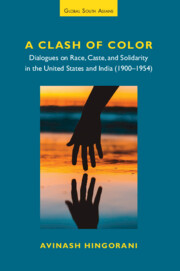 A Clash of Color
A Clash of Color Published online by Cambridge University Press: 28 November 2024
While Rabindranath Tagore and Taraknath Das did not travel to the US to learn about American racism, Lala Lajpat Rai specifically journeyed there to understand the Black experience. Rai was born in 1865 to a Jain family in the Punjab Province. His father was a teacher of the Urdu language at the Government Higher Secondary School where Rai also studied as a child. In 1880, Rai attended the Government College at Lahore to study law, graduating four years later. During his time at there, Rai began to grow disillusioned with British rule. In 1886, he moved to the village of Hisar in Haryana to practice law and founded the Hisar district branch of the Indian National Congress and the Arya Samaj, a Hindu reform movement. Like the Brahmo Samaj, the Arya Samaj campaigned against caste discrimination, and they supported widow remarriage and women's education. The organization also had an internationalist outlook and established chapters in British colonies with Indian populations, such as South Africa, Fiji, Mauritius, Suriname, Guyana, and Trinidad and Tobago. Rai was an active participant and campaigner during the early years of the organization's existence. Like the Arya Samaj, Rai had an internationalist philosophy toward advocating for Indian independence as well as social reform. In 1914, he quit practicing law to dedicate himself to the Indian independence movement fully. That same year, Rai planned a six-month trip to the US to collect material for a book on the plight of Black Americans. However, while he was in the US, the British categorized him as a political exile for criticizing British rule and he was not allowed to return to India until the end of 1919.
During his five-year stay in the US, Rai had a considerable impact on Americans. He formed alliances and garnered support for Indian self-rule from Irish nationalists, American civil rights activists, and other American anti-colonialists. In addition to seeking out support for Indian self-determination, the strife of Black Americans was a central part of Rai's advocacy. Rai wanted to understand how the Black American struggle related to the plight of Indians under the British Raj, and he also sought to compare American racism to the Indian caste system.
To save this book to your Kindle, first ensure no-reply@cambridge.org is added to your Approved Personal Document E-mail List under your Personal Document Settings on the Manage Your Content and Devices page of your Amazon account. Then enter the ‘name’ part of your Kindle email address below. Find out more about saving to your Kindle.
Note you can select to save to either the @free.kindle.com or @kindle.com variations. ‘@free.kindle.com’ emails are free but can only be saved to your device when it is connected to wi-fi. ‘@kindle.com’ emails can be delivered even when you are not connected to wi-fi, but note that service fees apply.
Find out more about the Kindle Personal Document Service.
To save content items to your account, please confirm that you agree to abide by our usage policies. If this is the first time you use this feature, you will be asked to authorise Cambridge Core to connect with your account. Find out more about saving content to Dropbox.
To save content items to your account, please confirm that you agree to abide by our usage policies. If this is the first time you use this feature, you will be asked to authorise Cambridge Core to connect with your account. Find out more about saving content to Google Drive.